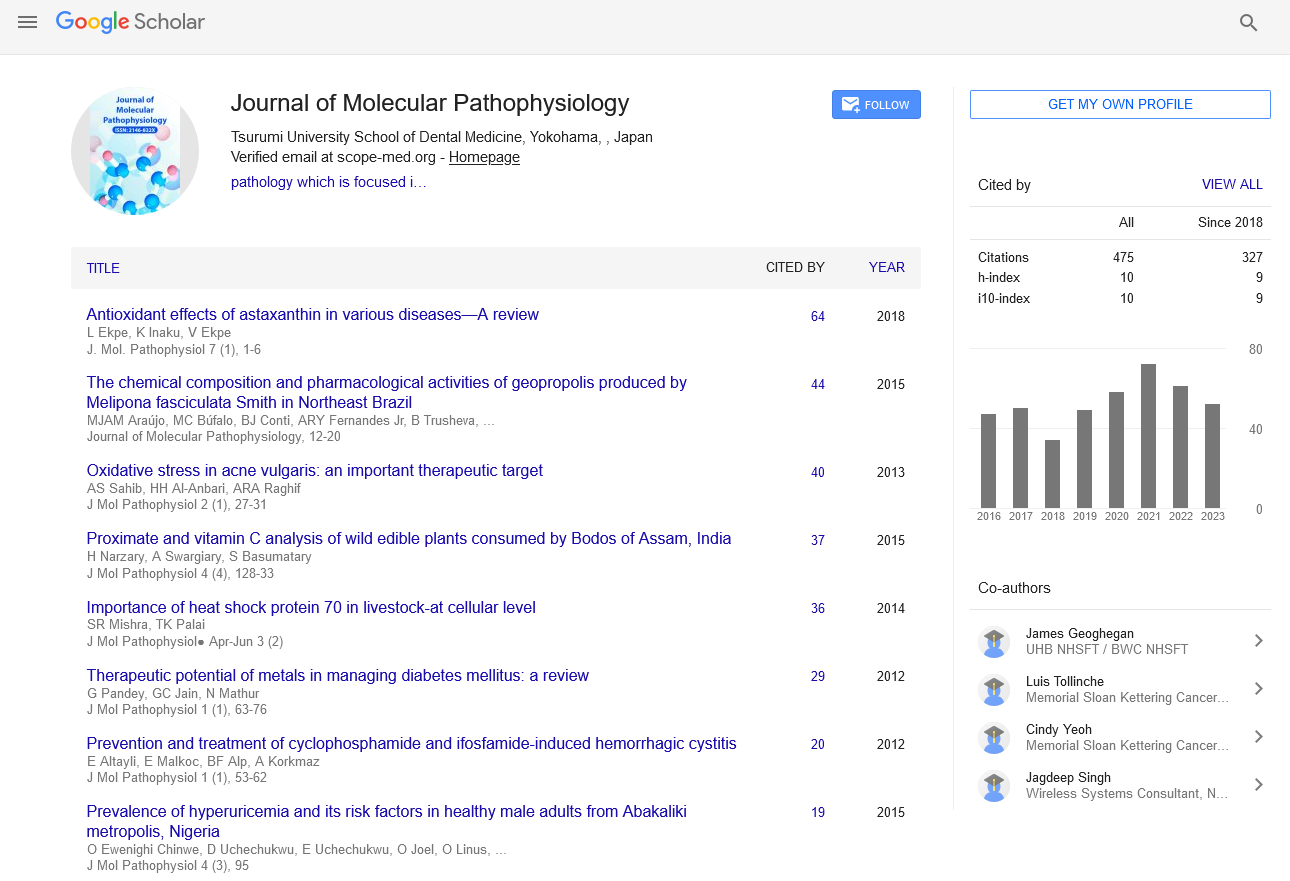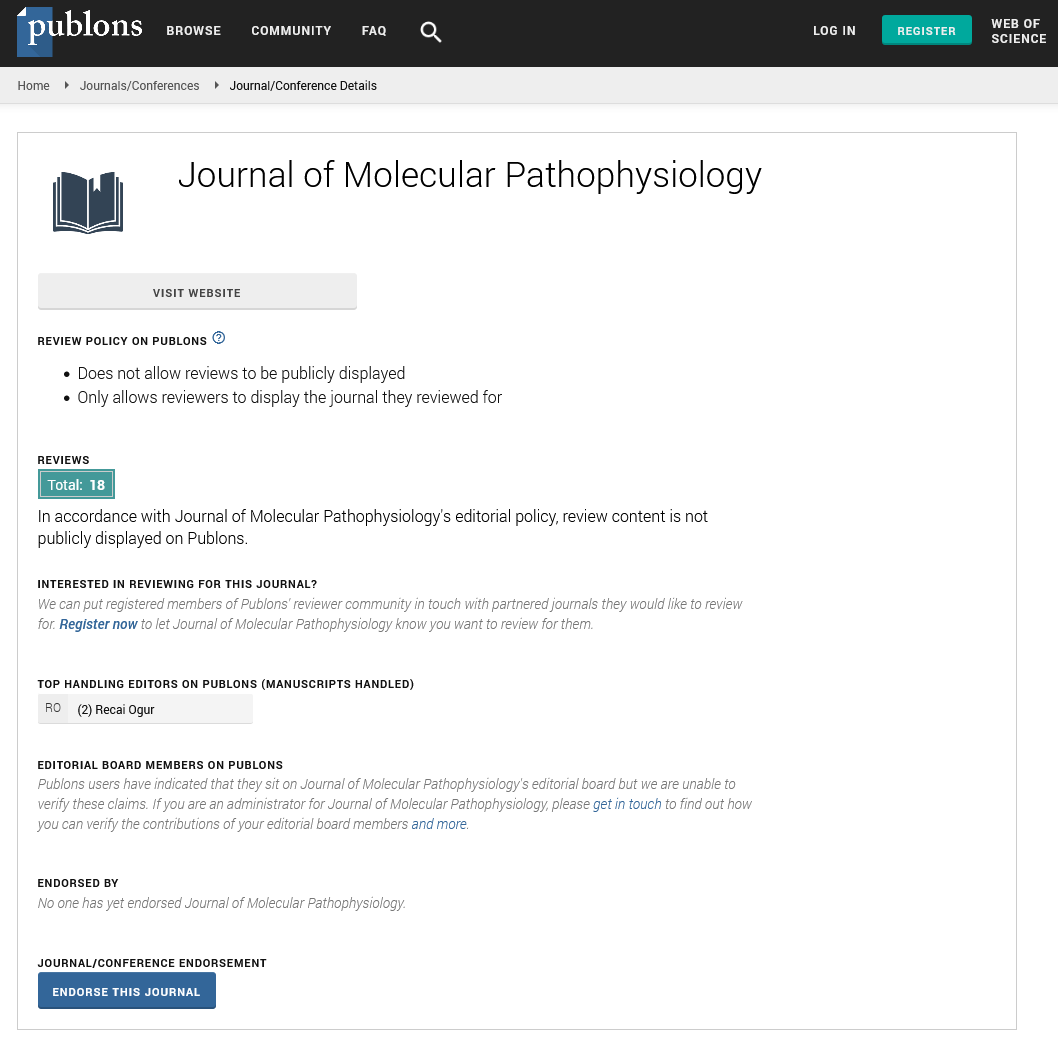Perspective - Journal of Molecular Pathophysiology (2022)
Symptoms, Affects and Diagnosis of Dementia
Lucio Bogli*Lucio Bogli, Department of Neurosurgery, University Hospital St. Anna, Ferrara, Italy, Email: Boglionee189@gmail.com
Received: 20-Apr-2022, Manuscript No. JMOLPAT-22-64053; Editor assigned: 22-Apr-2022, Pre QC No. JMOLPAT-22-64053 (PQ); Reviewed: 09-May-2022, QC No. JMOLPAT-22-64053; Revised: 16-May-2022, Manuscript No. JMOLPAT-22-64053 (R); Published: 23-May-2022
Description
Dementia is a syndrome of symptoms that occur when the brain is damaged by an injury or disease. Gradual memory, cognitive, and behavioural deficits are among the symptoms, which have a negative impact on a person’s ability to function and carry out daily tasks. Besides from memory loss and cognitive pattern disruption, emotional troubles, linguistic difficulty, and a lack of motivation are the most common symptoms. The symptoms might be defined as a progression across various phases [1,2].
The state of consciousness is unaffected. The individual with dementia, their caregivers, and their relationships in general are all affected by dementia. A change in a person’s ordinary mental functioning and a larger cognitive deterioration than normal ageing are required for a diagnosis of dementia. Dementia can be caused by a variety of brain disorders and accidents, such as a stroke [3-5].
The diagnosis is usually made based on the patient’s medical history and cognitive testing with imaging. Blood tests may be performed to rule out other reversible reasons, such as an underactive thyroid, as well as to define the subtype. Aging is the leading cause of dementia, yet dementia is not a normal part of the ageing process. Several dementia risk factors, such as smoking and obesity, can be avoided by lifestyle adjustments. Screening the broader elderly population for the condition does not appear to have any impact on the result. The neuropsychiatric symptoms, also known as behavioural and psychological symptoms of dementia, are the signs and symptoms of dementia. Agitation, restlessness, inappropriate behaviour, sexual disinhibition, and verbal or physical aggressiveness are examples of behavioural symptoms. Cognitive inhibition problems could cause these symptoms. Psychological symptoms include depression, hallucinations and delusions, apathy, and anxiety. The most commonly damaged areas include memory visuospatial function (which impacts perception and orientation), language, attention, and problem solving. The rate at which symptoms evolve differs by dementia subtype and occurs in stages. The majority of dementias progress slowly, with brain deterioration visible long before symptoms arise [6].
Diagnosis
Symptoms are similar among dementia kinds, making diagnosis by symptoms challenging. Brain scanning techniques may help in diagnosis. A brain biopsy is often required to confirm the diagnosis, but it is rarely recommended, even if it can be done at autopsy. General cognitive impairment screening via cognitive tests or early diagnosis of dementia has not been found to enhance outcomes in the elderly. However, screening checks are beneficial for people aged 65 and up who have memory problems [7,8].
To be diagnosed, symptoms must be present for at least six months. Short-term cognitive impairment is referred to as delirium. Because the symptoms of delirium and dementia are so similar, they are often confused. Delirium has a fast onset, a fluctuating course, a short duration (typically hours to weeks), and is primarily caused by a somatic disruption. Dementia, on the other hand, often has a long, slow onset, a slow deterioration in mental performance, and a lengthier trajectory.
It’s important to separate the symptoms of some mental illnesses, such as sorrow and psychosis, from those of delirium and dementia. Pseudodementias are classified differently, and any dementia assessment should include a depression test, such as the Neuropsychiatric Inventory or the Geriatric Depression Scale. Physicians used to believe that people with memory problems were depressed rather than suffering from dementia. Researchers have discovered that many older adults with memory problems actually have mild cognitive impairment, which is the first stage of dementia. However, for an aged individual with memory problems, depression should always be considered a possibility.
References
- Borbasi S, Jones J, Lockwood C, Emden C. Health professionals' perspectives of providing care to people with dementia in the acute setting: toward better practice. Geriatr Nurs 2006;27:300-308.
[Crossref] [Google scholar] [Pubmed]
- Moyle W, Olorenshaw R, Wallis M, Borbasi S. Best practice for the management of older people with dementia in the acute care setting: a review of the literature. Int J Older People Nursing 2008;3:121-130.
[Crossref] [Google scholar] [Pubmed]
- Dewing J, Dijk S. What is the current state of care for older people with dementia in general hospitals? A literature review. Dementia (London) 2016;15:106-124.
[Crossref] [Google scholar] [Pubmed]
- Digby R, Lee S, Williams A. The experience of people with dementia and nurses in hospital: an integrative view. Clin Nurs 2016;26:1152-1171.
[Crossref] [Google scholar] [Pubmed]
- Reilly JC, Houghton C. The experiences and perceptions of care in acute settings for patients living with dementia: a qualitative evidence synthesis. Int J Nurs Stud 2019;96:82-90.
[Crossref] [Google scholar] [Pubmed]
- Turner A, Eccles FJ, Elvish R, Simpson J, Keady J. The experience of caring for patients with dementia within a general hospital setting: a meta-synthesis of the qualitative literature. Aging Ment Health. 2017;21:66–76.
[Crossref] [Google scholar] [Pubmed]
- Burgstaller M, Mayer H, Schiess C, Saxer S. Experiences and needs of relatives of people with dementia in acute hospitals-A meta-synthesis of qualitative studies. J Clin Nurs 2018;27:502–515.
[Crossref] [Google scholar] [Pubmed]
- Gerritsen DL, van Beek APA, Woods RT. Relationship of care staff attitudes with social well-being and challenging behavior of nursing home residents with dementia: a cross sectional study. Aging Ment Health 2019;23:1517-1523.
[Crossref] [Google scholar] [Pubmed]
Copyright: © 2022 The Authors. This is an open access article under the terms of the Creative Commons Attribution NonCommercial ShareAlike 4.0 (https://creativecommons.org/licenses/by-nc-sa/4.0/). This is an open access article distributed under the terms of the Creative Commons Attribution License, which permits unrestricted use, distribution, and reproduction in any medium, provided the original work is properly cited.







